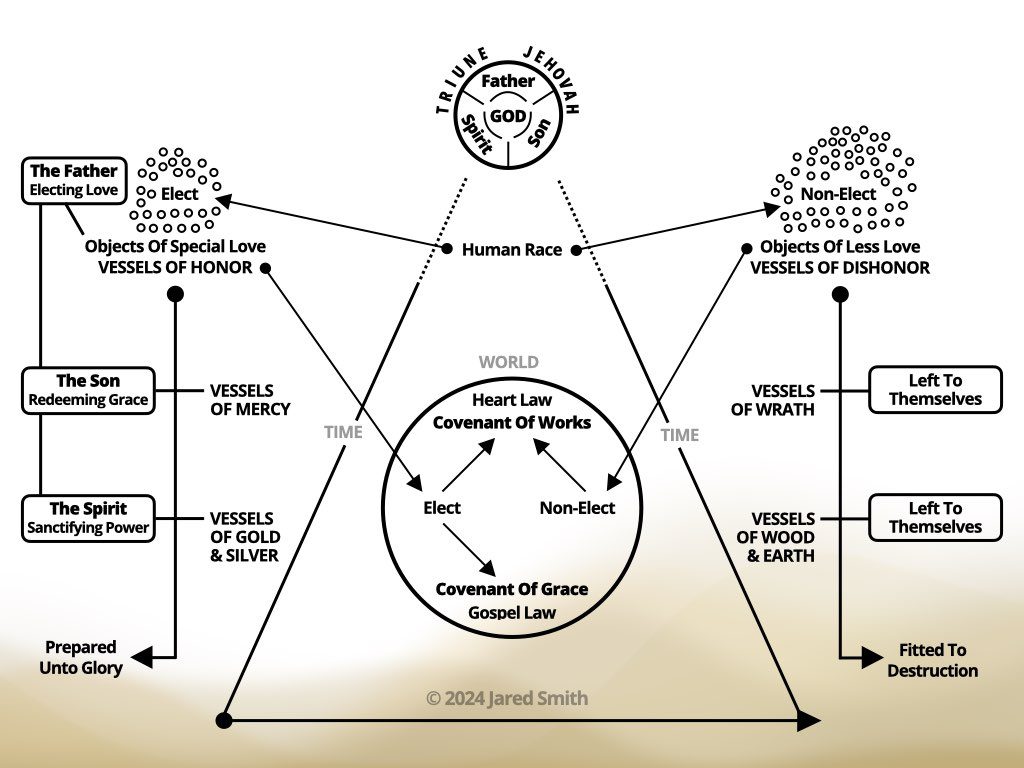Let Me, Thou Sovereign Lord Of All
The Apostle Paul instructed the believers at Colosse to teach and admonish one another in psalms, hymns and spiritual songs. That is what I hope to do by explaining the meaning of this hymn, against the backdrop of the Framework of Sovereign Grace.
[An automated transcript of the teaching video]
The Apostle Paul instructed the believers at Colosse to teach and admonish one another in psalms and hymns and spiritual songs. That’s what I intend to do by explaining the meaning of this hymn—Let Me, Thou Sovereign Lord Of All. I like to explain the meaning against the backdrop of the Framework of Sovereign Grace. This is the master plan of God for the ages.

You’ll notice the hymn was written by Samuel Medley. This was an 18th century Particular Baptist preacher. He served 27 years as pastor of the church meeting at Byrom Street in Liverpool.
The hymn has five stanzas and I’d like to read them for you.
1 Let me, Thou sovereign Lord of all,
Low at Thy footstool humbly fall;
And while I feel affliction’s rod,
Be still and know that Thou art God.
2 Let me not murmur nor repine,
Under these trying strokes of Thine;
But while I walk the mournful road,
Be still and know that Thou art God.
3 When and wherever Thou shalt smite;
Teach me to own Thy sovereign right;
And underneath the heaviest load,
Be still and know that Thou art God.
4 Still let this truth support my mind,
Thou canst not err nor be unkind;
And thus approve Thy chastening rod,
And know Thou art my Father, God!
5 When this afflicted soul shall rise,
To ceaseless joys above the skies,
I shall, as ransomed by Thy blood,
For ever sing, “Thou art my God!”
You’ll notice the hymn describes the trials and tribulations the Lord’s people are so often called upon to suffer during their earthly pilgrimage. We’re therefore looking at—when aligning this hymn with the Framework of Sovereign Grace—we’re looking at the third branch of the gospel. Remember, the gospel has three branches—the electing love of God the Father, the redeeming grace of God the Son and the sanctifying power of God the Spirit. And what Samuel Medley is driving at in this hymn has to do with the experience of the Lord’s people under the sanctifying power of the Holy Spirit.
Just to remind you how this works: At the appointed time throughout the course of history, the Holy Spirit conquers the hearts of all God’s elect people, and he unites their souls with the Lord Jesus Christ. The life and the graces of Christ flow into the soul, making us alive unto God through Jesus Christ and giving to us the ability to savingly believe on Christ. It is this new birth experience that is our entrance into the Christian life. And from this point forward, our life on this earth is depicted by Samuel Medley and our hymn as often being overshadowed by afflictions and tribulations. And very often those afflictions and tribulations are given to us as a result of God’s chastening, as a loving father to His wayward children. So we’re dealing here with the way in which God sovereignly chooses to conduct the lives of his people as they continue through their earthly pilgrimage, often in trials and tribulations.
With that in mind, I turn you to the first stanza.
Stanza 1
“Let me, Thou sovereign Lord of all,”
We’re speaking now of the Triune Jehovah, the absolute sovereign both of heaven and earth, specifically of my soul and all the circumstances that surround my life.
“Low at Thy footstool humbly fall;
And while I feel affliction’s rod,
Be still and know that Thou art God.”
I’m down here (on earth) and I humbly fall under his footstool. He sits on the throne and I’m under the stool upon which His foot sits. And while I feel affliction’s rod, like a belt or a stick that is sometimes used by a parent to administer corrective discipline, so I sometimes feel this afflicting rod, this chastening rod that God uses to correct me. But I must then yield myself to this sovereign Lord. I say to my soul, be still, be calm, be composed, and know that He is God.
Stanza 2
“Let me not murmur nor repine,
Under these trying strokes of Thine;”
So common is this our response to the afflictions that we are made to bear. But here our prayer should be, Don’t Lord, allow me to murmur or complain, under these trying strokes of thine—the beatings that I’m receiving.
“But while I walk the mournful road,
Be still and know that Thou art God.”
But while I walk the mournful road—and it is mournful. No chastening of the Lord is pleasant at the time of the chastening process. It is a very sorrowful and painful and mournful experience. But it is then when we’re under the chastening hand of God, that we are to be still without murmuring or repining, and simply take comfort in knowing that He is God.
Stanza 3
“When and wherever Thou shalt smite;
Teach me to own Thy sovereign right;”
Whatever time it might be in my life, and wherever it takes place, teach me. It’s a lesson that I must learn. Teach me to own Thy sovereign, right!
“And underneath the heaviest load,
Be still and know that Thou art God.”
And underneath the heaviest load—the severest strokes of the chastening rod enable me to be calm, to be still, and know that Thou art God,
Stanza 4
“Still let this truth support my mind,
Thou canst not err nor be unkind;
And thus approve Thy chastening rod,
And know Thou art my Father, God!”
For how tempting is it for us to sometimes think, when God is severely chastising us, that He must have made a mistake, or He must be showing unkindness to us? But no, says Samuel medley, Let this truth support me during the severest afflictions—that God cannot make a mistake, nor can He be unkind. And therefore, enable me to approve Thy chastening rod, while I’m under the harshest and hottest strokes of affliction. May I then be able to humbly say, God, it is not only Your right to be conducting me in this way, but You are right to be doing so. I approve of it. I need this corrective discipline. Let me therefore know that You are my Father God. What child is there that does not receive chastisement? The point being, chastisement is evidence of the relationship between a father and his child. If there was no chastisement, then there is no father-son or father-daughter relationship. And that’s the point here. It’s because God is choosing to chastise me, it’s an evidence that I am His child and He is my Father. And that in itself is a comfort to my soul.
Stanza 5
“When this afflicted soul shall rise,
To ceaseless joys above the skies,
I shall, as ransomed by Thy blood,
For ever sing, “Thou art my God!”
In other words, as strangers and pilgrims in this world, we are not perfect in the flesh. The corruptions of sin still molest and assault our souls. And the only time we will be released from that sin and perfected in Christ is when He returns. And we are given glorified bodies and we will truly be like Him on that day. And that is where you and I may now be in our current pilgrimage with the Lord. Like Paul, we may be so frustrated and put out and at our wits end because of our sin. And we long for the day when this afflicted soul shall rise, with ceaseless joys above the skies, and we then shall have this new song, ever singing—He is my God, ransomed by the blood of Christ.
So it’s a hymn, my dear friend, that should bring great encouragement as well as instruction. If you and I find ourselves experiencing the chastening rod of God, let this be an evidence that God is for us, not against us. And let us now sing to His glory this hymn.
Jared Smith served twenty years as pastor of a Strict and Particular Baptist church in Kensington (London, England). He now serves as an Evangelist in the Philippines, preaching the gospel, organizing churches and training gospel preachers.
Jared Smith's Online Worship Services
Jared Smith's Sermons
Jared Smith on the Gospel Message
Jared Smith on the Biblical Covenants
Jared Smith on 18th Century Covenant Theology (Hyper-Calvinism)
Jared Smith on the Gospel Law
Jared Smith on Bible Doctrine
Jared Smith on Bible Reading
Jared Smith's Hymn Studies
Jared Smith on Eldership
Jared Smith's Studies In Genesis
Jared Smith's Studies in Romans
Jared Smith on Various Issues
Jared Smith, Covenant Baptist Church, Philippines
Jared Smith's Maternal Ancestry (Complete)






